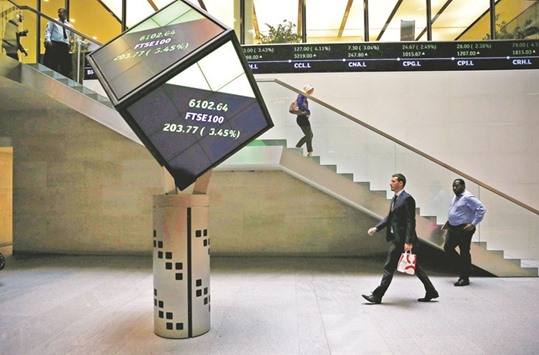London Stock Exchange Group shareholders have overwhelmingly voted to approve a plan to merge with Deutsche Boerse, hoping the deal can go through despite Britain’s vote to leave the European Union.
The British company asked its shareholders to back its $27bn merger with its German counterpart to create a European exchange giant yesterday, dismissing concerns it was “shackling itself to a corpse” after Britain’s EU referendum result.
LSEG Chairman Donald Brydon told an extraordinary meeting of shareholders that he was confident of “satisfactory” regulatory approval for the deal from Brussels.
“There is no reason to think otherwise today,” Brydon said. Some 50 shareholders gathered for the subdued, short meeting. It was free of demonstrations, with only two questions asked.
LSE said afterwards that more than 99.89% of votes cast at the shareholder meeting were in favour of the deal.
Dinesh Jain, an individual shareholder, asked why, given that Britain was leaving the EU, “do we want to shackle ourselves to a corpse”.
The exchange should abandon the merger as it seemed “unlikely” that Germany would now approve it given that Britain would be outside the EU, Jain said.
LSEG should instead to be looking to do deals with “lively” Asian or Latin American exchanges, Jain said.
He also asked whether any American or other exchange had made a counterbid, and about any threat to LSEG’s business from French President Francois Hollande’s desire to repatriate euro-denominated clearing to the euro zone. Brydon said Hollande’s comments were a measure of how valuable LSEG’s operations were.
“You are quite right, there are some people already seeking to pick over the bones of the UK very, very rapidly indeed.
Everyone would be wise to take things a step at a time in this area,” Brydon said
LSEG’s LCH.Clearnet is the main clearing house in Europe for euro denominated swaps.
Brydon denied that LSEG had received any approaches from any company other than Deutsche Boerse. The New York Stock Exchange’s owner ICE, in May shelved plans to make a counterbid for LSE, putting the brakes on a potential takeover battle in the exchanges sector.
Britain would remain in the EU for at least another two years, during which there was ample time to work out the “optimal structure” for the deal, Brydon said.
Last week, German markets regulator BaFin said it was hard to see how the head office of the merged group could still be in London given that Britain was leaving the EU.
LSEG Chief Executive Xavier Rolet said the group was “extremely well positioned” globally no matter what the outcome of British negotiations with the EU on new trading terms.
Deutsche Boerse is also asking its shareholders to back the deal — the third attempt by the LSE to merge with the German exchange operator in some 16 years — in a postal vote that closes on July 12.
The deal would create the world’s biggest exchange by revenue, forecast at €4.7bn this year from stock, bond and derivatives trading, indexes, market data, and clearing and settlement.

People walk through the lobby of the London Stock Exchange. The LSE shareholders have overwhelmingly voted to approve a plan to merge with Deutsche Boerse, hoping the deal can go through despite Britain’s vote to leave the European Union.
